- Clone
- K036C2 (See other available formats)
- Regulatory Status
- RUO
- Other Names
- CKR2, CCR2A, CCR2B, CKR2A, CKR2B, CMKBR2, MCP-1-R, CC-CKR-2
- Isotype
- Mouse IgG2a, κ
- Ave. Rating
- Submit a Review
- Product Citations
- publications
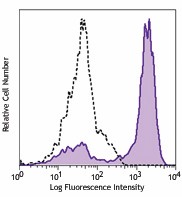
-

Human peripheral blood monocytes were stained with CD192 (CCR2, clone K036C2) PerCP/Cyanine5.5 (filled histogram) or mouse IgG2a, κ PerCP/Cyanine5.5 isotype control (open histogram).
| Cat # | Size | Price | Quantity Check Availability | Save | ||
|---|---|---|---|---|---|---|
| 357203 | 25 tests | 176 CHF | ||||
| 357204 | 100 tests | 382 CHF | ||||
CCR2 is a chemokine receptor that binds monocyte chemoattractant proteins (MCP-1, 2, 3 and 4). Two spliced variants were initially described for CCR2 (CCR2A and CCR2B). These variants differ in their terminal carboxyl tails. Monocyte adhesion to the arterial endothelium and subsequent migration into the intima are central events in the pathogenesis of atherosclerosis. CCR2 and MCP-1 have been associated to atherosclerotic plaques. MCP-1 is induced by modified-LDL in endothelial cells and may trigger firm adhesion of monocytes to vascular endothelium under flow conditions. Local overexpression of MCP-1 at vessel walls induces infiltration of macrophages and formation of atherosclerotic lesions. Obesity induces an inflammatory state that is implicated in many clinically important complications, including insulin resistance, diabetes, atherosclerosis, and non-alcoholic fatty liver disease. CCR2 influences the development of obesity and associated adipose tissue inflammation.
Product DetailsProduct Details
- Verified Reactivity
- Human
- Antibody Type
- Monoclonal
- Host Species
- Mouse
- Immunogen
- CCR2 DNA immunogen
- Formulation
- Phosphate-buffered solution, pH 7.2, containing 0.09% sodium azide and BSA (origin USA)
- Preparation
- The antibody was purified by affinity chromatography and conjugated with PerCP/Cyanine5.5 under optimal conditions.
- Concentration
- Lot-specific (to obtain lot-specific concentration and expiration, please enter the lot number in our Certificate of Analysis online tool.)
- Storage & Handling
- The antibody solution should be stored undiluted between 2°C and 8°C, and protected from prolonged exposure to light. Do not freeze.
- Application
-
FC - Quality tested
- Recommended Usage
-
Each lot of this antibody is quality control tested by immunofluorescent staining with flow cytometric analysis. For flow cytometric staining, the suggested use of this reagent is 5 µl per million cells in 100 µl staining volume or 5 µl per 100 µl of whole blood.
* PerCP/Cyanine5.5 has a maximum absorption of 482 nm and a maximum emission of 690 nm. - Application Notes
-
Epitope of clone K036C2 has been mapped to amino acids 11-29 and 21-39 of human CCR2.
-
Application References
(PubMed link indicates BioLegend citation) -
- Tanaka T, et al. 2022. Monoclon Antib Immunodiagn Immunother. 41(5):285-289 (Epitope)
- Product Citations
-
- RRID
-
AB_2562003 (BioLegend Cat. No. 357203)
AB_2562004 (BioLegend Cat. No. 357204)
Antigen Details
- Structure
- Chemokine receptor, GPCR, seven transmembrane receptor
- Distribution
-
Monocytes, macrophages, immature dendritic cells, memory T cells
- Function
- Induces monocyte adhesion to endothelial cells and chemotaxis
- Ligand/Receptor
- CCL2 (MCP-1), CCL7 (MCP-3), CCL8 (MCP-2), CCL13 (MCP-4), CCL16 (HCC4)
- Cell Type
- Dendritic cells, Macrophages, Monocytes, T cells
- Biology Area
- Cell Adhesion, Cell Biology, Immunology, Innate Immunity, Neuroinflammation, Neuroscience
- Molecular Family
- CD Molecules, Cytokine/Chemokine Receptors, GPCR
- Antigen References
-
1. Wong LM, et al. 1997. J. Biol. Chem. 272:1038.
2. Papadopoulou C, et al. 2008. Cytokine 43:181.
3. Barlic J, et al. 2007. J. Leukoc. Biol. 82:226.
4. Gu L, et al. 1998. Mol. Cell 2:275.
5. Volpe S, et al. 2012. PLoS One. 7:e37208. - Gene ID
- 729230 View all products for this Gene ID
- UniProt
- View information about CD192 on UniProt.org
Related FAQs
- Does staining at room temperature or even at 37°C help for checking chemokine receptors expression?
-
Due to continuous recycling of many chemokine receptors, it may be worthwhile to consider staining at room temperature or at 37°C if the staining at lower temperature (which can potentially reduce receptor turnover) is not optimal.
- How stable is PerCP/Cyanine5.5 tandem as compared to PerCP alone?
-
PerCP/Cyanine5.5 is quite photostable and also better than PerCP alone in withstanding fixation.
Other Formats
View All CD192 Reagents Request Custom Conjugation| Description | Clone | Applications |
|---|---|---|
| Purified anti-human CD192 (CCR2) | K036C2 | FC |
| PerCP/Cyanine5.5 anti-human CD192 (CCR2) | K036C2 | FC |
| PE anti-human CD192 (CCR2) | K036C2 | FC |
| APC anti-human CD192 (CCR2) | K036C2 | FC |
| Brilliant Violet 421™ anti-human CD192 (CCR2) | K036C2 | FC |
| PE/Cyanine7 anti-human CD192 (CCR2) | K036C2 | FC |
| Brilliant Violet 605™ anti-human CD192 (CCR2) | K036C2 | FC |
| Brilliant Violet 510™ anti-human CD192 (CCR2) | K036C2 | FC |
| APC/Cyanine7 anti-human CD192 (CCR2) | K036C2 | FC |
| PE/Dazzle™ 594 anti-human CD192 (CCR2) | K036C2 | FC |
| Biotin anti-human CD192 (CCR2) | K036C2 | FC |
| Alexa Fluor® 488 anti-human CD192 (CCR2) | K036C2 | FC |
| APC/Fire™ 750 anti-human CD192 (CCR2) | K036C2 | FC |
| TotalSeq™-A0242 anti-human CD192 (CCR2) | K036C2 | PG |
| Brilliant Violet 711™ anti-human CD192 (CCR2) | K036C2 | FC |
| Brilliant Violet 785™ anti-human CD192 (CCR2) | K036C2 | FC |
| TotalSeq™-B0242 anti-human CD192 (CCR2) Antibody | K036C2 | PG |
| TotalSeq™-C0242 anti-human CD192 (CCR2) | K036C2 | PG |
Customers Also Purchased
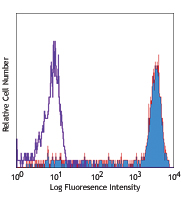
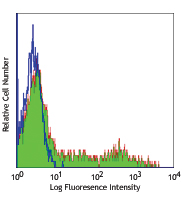
Compare Data Across All Formats
This data display is provided for general comparisons between formats.
Your actual data may vary due to variations in samples, target cells, instruments and their settings, staining conditions, and other factors.
If you need assistance with selecting the best format contact our expert technical support team.
-
Purified anti-human CD192 (CCR2)
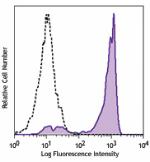
Human peripheral blood monocytes were stained with purified ... -
PerCP/Cyanine5.5 anti-human CD192 (CCR2)
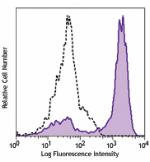
Human peripheral blood monocytes were stained with CD192 (CC... -
PE anti-human CD192 (CCR2)
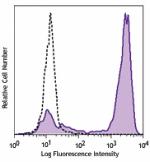
Human peripheral blood monocytes were stained with CD192 (cl... -
APC anti-human CD192 (CCR2)
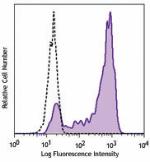
Human peripheral blood monocytes were stained with CD192 (CC... -
Brilliant Violet 421™ anti-human CD192 (CCR2)
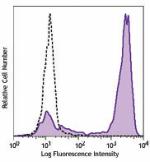
Human peripheral blood monocytes were stained with CD192 (cl... -
PE/Cyanine7 anti-human CD192 (CCR2)
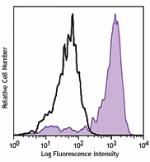
Human peripheral blood monocytes were stained with CD192 (cl... -
Brilliant Violet 605™ anti-human CD192 (CCR2)
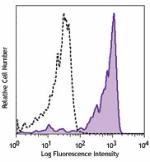
Human peripheral blood monocytes were stained with CD192 (cl... -
Brilliant Violet 510™ anti-human CD192 (CCR2)
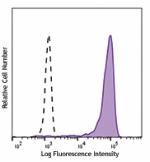
Human peripheral blood monocytes were stained with CD192 (cl... -
APC/Cyanine7 anti-human CD192 (CCR2)
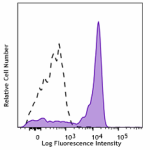
Human peripheral blood monocytes were stained with CD192 (CC... -
PE/Dazzle™ 594 anti-human CD192 (CCR2)
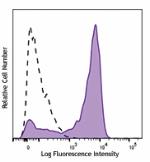
Human peripheral blood monocytes were stained with CD192 (cl... -
Biotin anti-human CD192 (CCR2)
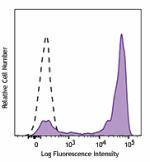
Human peripheral blood monocytes were stained with biotinyla... -
Alexa Fluor® 488 anti-human CD192 (CCR2)
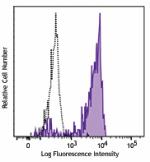
Human peripheral blood monocytes were stained with CD192 (cl... -
APC/Fire™ 750 anti-human CD192 (CCR2)
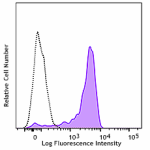
Human peripheral blood monocytes were stained with CD192 (CC... -
TotalSeq™-A0242 anti-human CD192 (CCR2)
-
Brilliant Violet 711™ anti-human CD192 (CCR2)
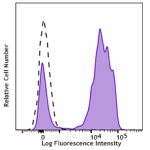
Human peripheral blood monocytes were stained with CD192 (cl... -
Brilliant Violet 785™ anti-human CD192 (CCR2)
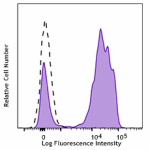
Human peripheral blood monocytes were stained with CD192 (cl... -
TotalSeq™-B0242 anti-human CD192 (CCR2) Antibody
-
TotalSeq™-C0242 anti-human CD192 (CCR2)
 Login / Register
Login / Register 










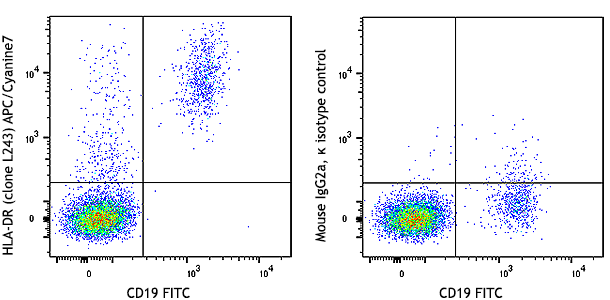
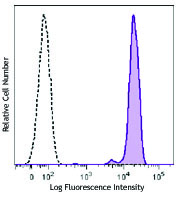



Follow Us